Description
The MENA Power Projects Market 2025
The MENA Power Projects Market 2025 is the latest premium market report from MEED, the region’s most trusted source of business intelligence. Using MEED’s analyst-curated datasets and privately sourced project information, the report presents an in-depth, country-by-country evaluation of the power sector across 14 key markets.
This report offers unparalleled insights into:
- Electricity demand trends and generation capacity
- Transmission, distribution and grid modernisation
- Energy transition strategies and renewables growth
- Investment outlook, policy frameworks and procurement opportunities
- Decarbonisation efforts and the shift to sustainable energy
Energy Transition Fuels Investment in the Middle East Power Sector
Rising demand, evolving solutions—The MENA region is experiencing unprecedented growth in energy demand, driven by population expansion, rapid urbanisation and industrial development. Meeting this demand requires massive investment in power generation, transmission and distribution infrastructure.
The power sector remains one of the most attractive and reliable investment opportunities in MENA. However, the nature of investment is evolving—it’s no longer just about increasing capacity. Governments are now prioritising decarbonisation, energy efficiency and financial sustainability to transform the sector for the future.
The Shift to a Sustainable Power Market
The MENA region is at the forefront of the global energy transition, with governments actively working to:
Diversify energy sources: The biggest transformation in MENA’s power sector is the drive to diversify the energy mix. With limited gas supplies and falling renewable technology costs, nearly all MENA countries are actively procuring or planning solar and wind projects. Additionally, governments are expanding into waste-to-energy, nuclear power and green hydrogen to meet future energy demands.
Improve energy security: As natural gas shortages continue to challenge regional energy security, MENA nations are increasingly investing in alternative energy solutions to ensure a stable, long-term power supply.
Enhance grid efficiency: Utilities are leveraging digital technologies such as AI, IoT, smart grids, blockchain and digital twins to optimise grid performance, reduce waste and improve overall efficiency.
Reform energy pricing: Sustainability and energy efficiency are driving landmark policy shifts, including the removal of long-standing energy subsidies that have kept electricity and water tariffs artificially low for decades. These reforms aim to ease financial pressure on governments, while encouraging consumers to adopt more efficient energy use, ultimately reducing the need for continuous capacity expansion.
Accelerate private sector involvement: To distribute the cost of new capacity over a longer period, governments are turning to privately developed utility projects. Broader privatisation efforts are also underway, with plans to unbundle generation, transmission and distribution assets, improving sector efficiency and unlocking new investment opportunities.
New Procurement & Investment Strategies: To attract investment while balancing fiscal constraints, governments are embracing new procurement models such as public-private partnerships (PPPs), independent power projects (IPPs) and asset privatisation. The unbundling of generation, transmission and distribution is unlocking fresh opportunities for investors and enabling a more competitive and efficient power sector.
The MENA Power Projects Market 2025 – Key Insights
- Comprehensive Market Overview – Gain a deep understanding of the power sector structure across MENA.
- Policy & Investment Analysis – Explore the latest energy policies, regulatory frameworks and investment trends shaping the region.
- Renewable Energy Outlook – Assess the future of renewable projects and sustainable energy initiatives in MENA.
- Project Investment Pipeline – Get detailed insights into power sector investment plans across 14 key MENA markets.
- Sustainable Energy Strategies – Examine initiatives driving the transition to cleaner and more efficient power generation.
- Opportunities in Renewables – Identify high-potential renewable energy projects and emerging investment hotspots.
- Policy & Regulatory Review – Understand the key policies, government initiatives and organisations driving power sector investment.
- Project & Procurement Insights – Access critical details on upcoming projects, procurement processes and key stakeholders.
- Investment Drivers & Spending Plans – Discover what’s fueling project financing and future spending in the region.
- Risk Assessment & Strategy Development – Mitigate risks and refine your market approach with expert-backed insights.
- Includes human-verified project data you can’t find anywhere else.
Exclusively from MEED, The MENA Power Projects Market 2025 is of high value to government decision makers, developers, investors, contractors, consultants and manufacturers in the Middle East power sector.
Delivered digitally via email, this exclusive MEED Insight report also includes a special focus on MENA’s plans for green hydrogen development, ensuring you stay ahead in the region’s sustainable energy transition.
The MENA Power Projects Market 2025 – Key Topics
- Energy demand trends
- Power generation capacity
- Impact of energy transition
- The future of Middle East utilities
- The impact of new fuels and digital technology on energy costs
- Transmission and distribution projects
- The key investors, owners, operators and contractors
- Finance and privatisation
- Power investment trends in the Middle East
- How Middle East oil producers are responding to the energy transition
- An update on progress on the energy diversification
- Analysis of renewable project spending plans across 14 markets across the region, including: Algeria, Bahrain, Egypt, Iraq, Jordan, Kuwait, Lebanon, Libya, Morocco, Oman, Qatar, Saudi Arabia, Tunisia and the UAE
- Explains the structure of the power sector in 14 markets
- Details the main projects being planned, under development and those due to be awarded in 2025 and beyond
- Projects opportunities with client and procurement details
- Investment drivers and client spending plans
- Understand risks and set strategy in the Middle East and North Africa
- Identifies the biggest spending clients
- Identifies the most successful contractors
- Identifies risks and opportunities
Who will benefit from The MENA Power Projects Market 2025 report?
- Power investors and developers
- Renewable energy developers
- Clean technology providers
- Financiers
- Bankers
- Economists and analysts
- Policy makers
- Legislators
- EPC contractors
- Construction companies and suppliers
- Manufacturers
- Engineering consultants
- PPP investors
- Power developers
- Technology companies
- Academics
- Researchers
- ACWA Power
- Saudi Electricity Company (SEC)
- Saudi Water Partnership Company (SWPC)
- DEWA
- TAQA – Abu Dhabi National Energy Company
- Masdar
- QatarEnergy
- ONEE
- Ministry of Electricity & Renewable Energy Egypt
- Marafiq
What is unique about this report?
- MEED’s most comprehensive report ever on the Middle East’s power sector
- MEED’s unrivalled expertise and insight on the Middle East
- Exclusive MEED Projects data
- Focus on outlook for investment
All the MEED Insight reports are delivered via email in digital version.
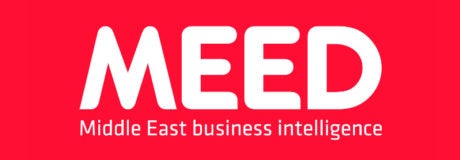
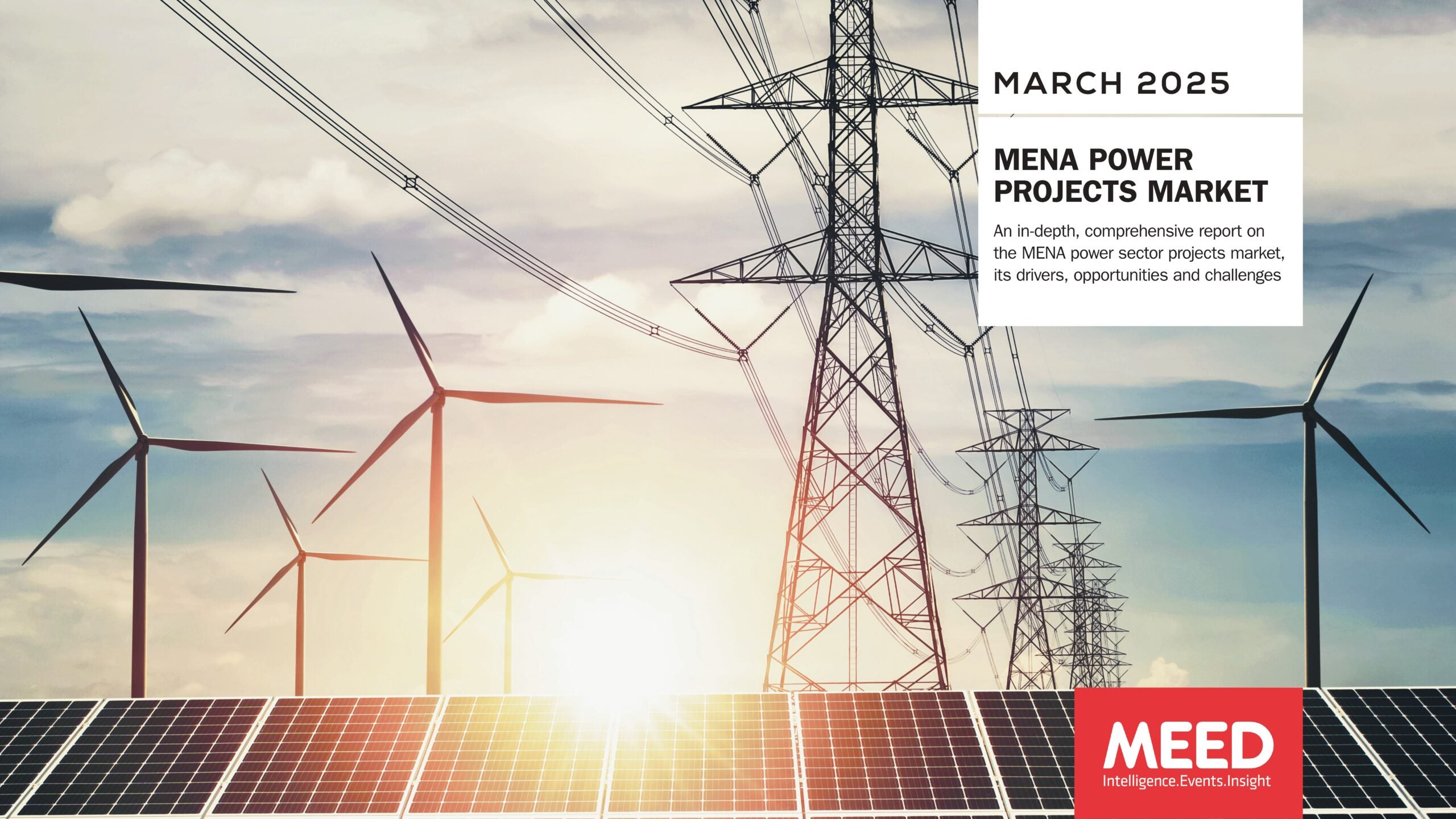
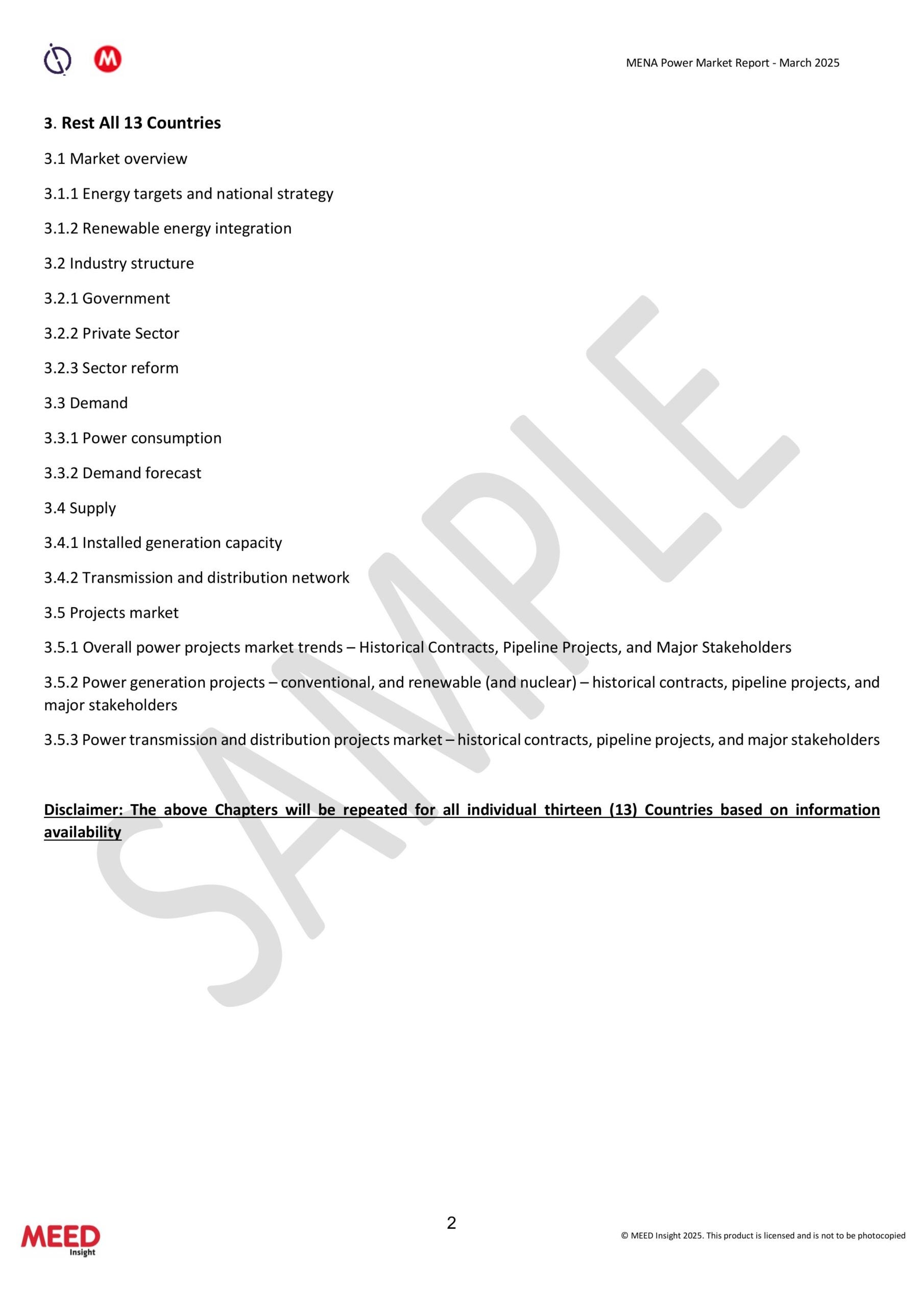
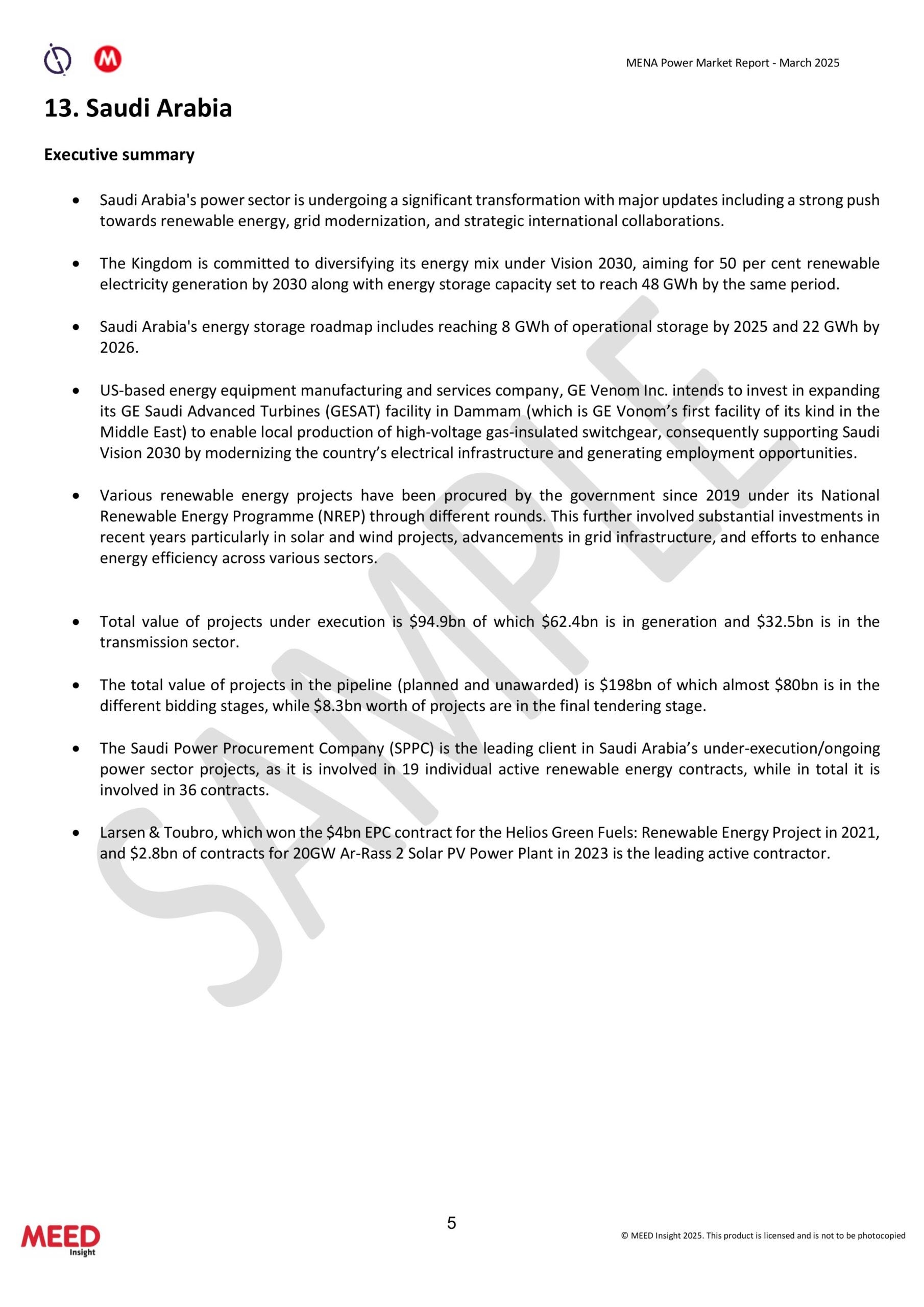
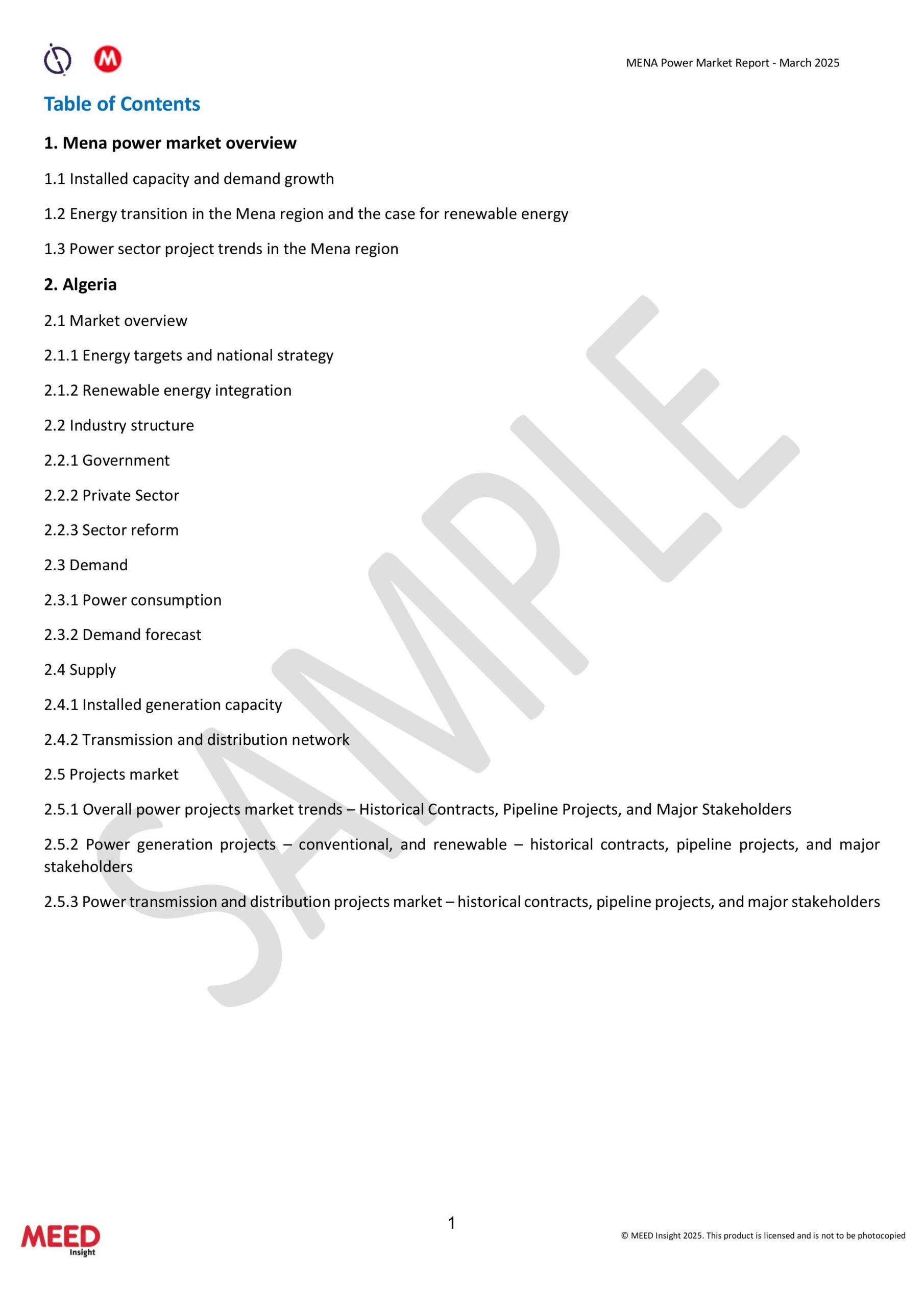
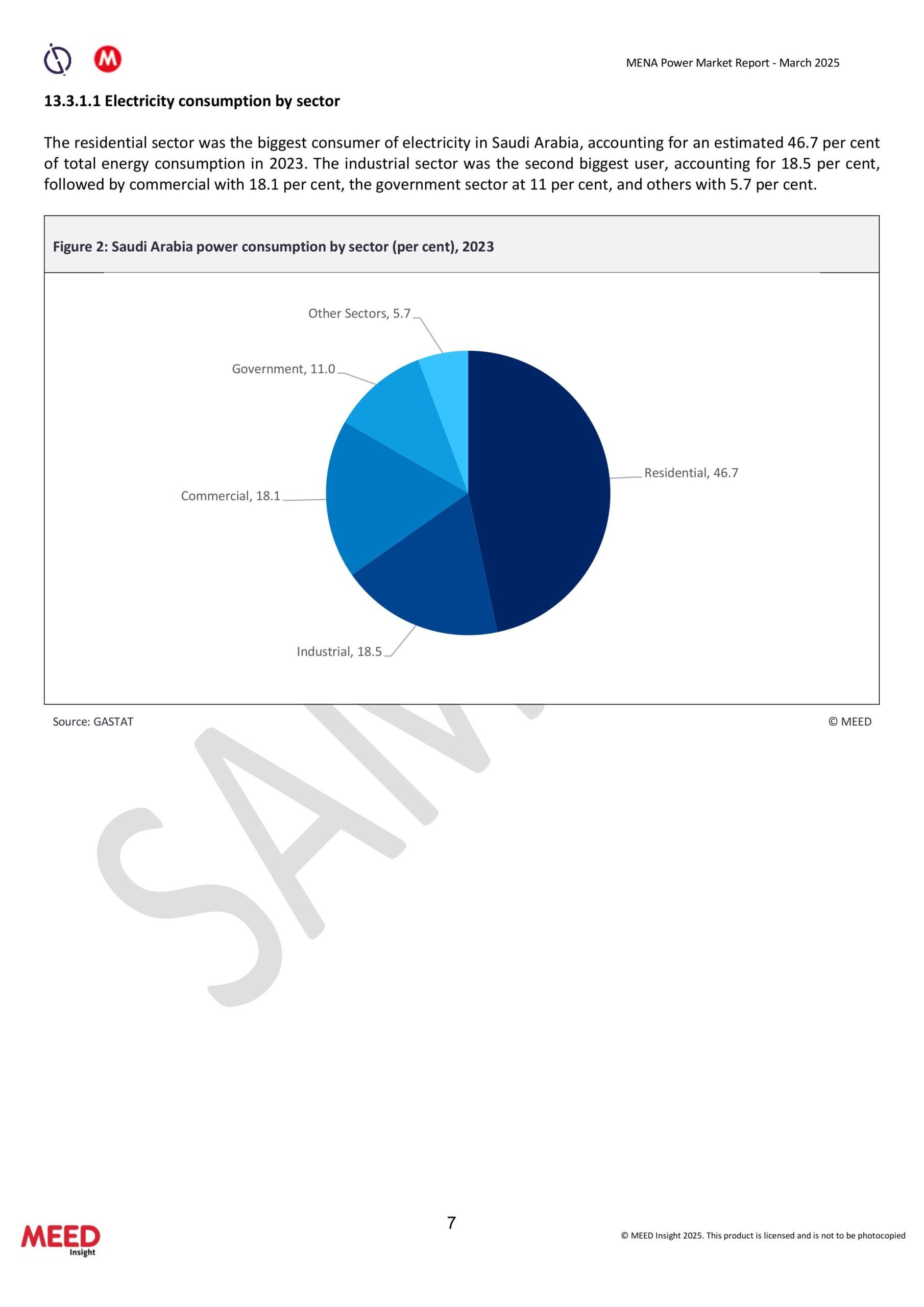
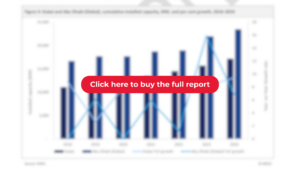
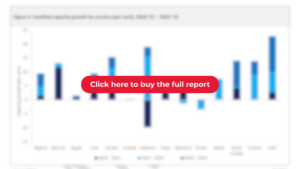
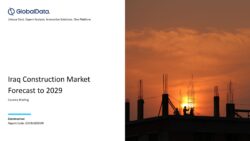
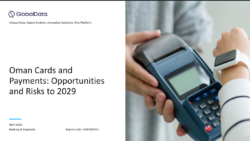
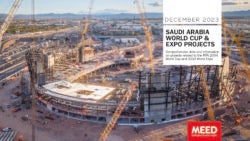
Sajit –
Very detailed report. We purchased the 2017 version and it helped us a lot to understand the industry trends and forecast.
Nuresh –
This has been a valuable source of information that gives us a deeper insight into the Power sector in the Middle East. We have been purchasing a new edition of the MEED Power report since 2016.
Farah Al Shather –
Good